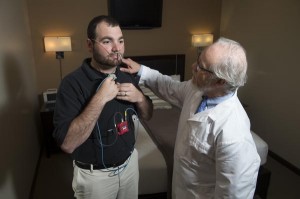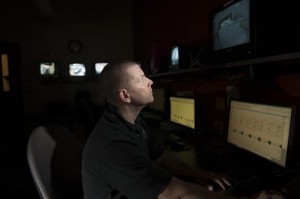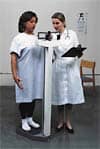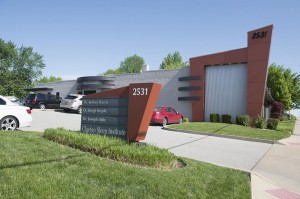
CSI is an independent sleep laboratory accredited for in-lab and home sleep testing by the American Academy of Sleep Medicine.
St Louis-based Clayton Sleep Institute has thrived in today’s tough sleep market by building long-term relationships, anticipating the market, and offering a range of services to a diverse patient population.
While other sleep labs around the country are struggling to keep up with the changing reimbursement and treatment landscape, St Louis-based Clayton Sleep Institute (CSI) has bucked this trend by offering its patients in Missouri and Illinois a range of services they need right now while anticipating the next trend.
For instance, the sleep center began developing a home sleep testing program well in advance of its payors’ requirements that it offer such a program. While recognizing most patients are suffering from some form of sleep apnea, CSI offers a range of sleep services beyond apnea care, including treating insomnia and neurological sleep disorders. In addition, the sleep center is actively engaged in a range of research studies tied to sleep and related disorders.
While CSI has charted a success in the 12 years since it was founded by St Louis native Joseph Ojile, MD, D.ABSM, FCCP, its story begins when the market seemed less than conducive for a full-service sleep institute.
Filling a Niche
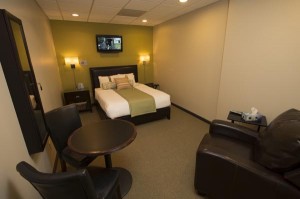
The sleep clinics encourage patients to prepare for bed as they normally would at home, but exclude caffeine and napping the day of the test and the use of electronic devices in the room.
Ojile recalls that the germ of the Clayton Sleep Institute’s creation came out of a meeting he and his colleague and future CSI medical director, Korgi Hegde, MD, FACP, FCCP, had with a local hospital about its sleep services.
“It was a good meeting,” Ojile says. “But after the meeting, the hospital decided it wanted to close down its program.”
Ojile was offered the hospital’s clinical assets for an off-site clinic. “Without hesitation, I said ‘yes’ to the hospital’s offer,” he says. Shortly thereafter, a neighboring hospital made the same offer. Clayton Sleep Institute was born.
Ojile handpicked his clinical team, many of whom are still with him, and built a boutique, spa-like space that was designed to cater to the needs of the patients and is regularly refreshed and updated. “I wanted to engage with our patients in long-term ways with a high-tech and high-touch environment,” he says. “We have a concierge mentality.”
This long-term approach also has been cultivated with payors. “Our philosophy is to be collaborative with the payors,” he says, adding that referring physicians are also a key part of the comprehensive approach to care at CSI.
The main Clayton Sleep facility has seven beds and runs 6 nights a week for in-lab testing. Including the affiliate locations, CSI has about 36 beds available for in-lab testing.
That comprehensive care begins with treating sleep apnea patients, both in the lab and through home sleep testing.
Getting to the Game Early
For the St Louis market, one of the biggest game changers that has come out of CSI has been home sleep testing, a service several of CSI’s competitors refused to offer.
“We wanted to stay ahead of the curve,” says Mark Muehlbach, PhD, FAASM, RPSGT, CSI’s clinical and Insomnia Center director, and co-director of the CSI Research Center. CSI has been offering home sleep testing since 2011.
With more payors now requiring home sleep testing, CSI has seamlessly been able to offer the service with great success. “We have very few failures with home sleep testing—it’s about what we’d see in overnight tests,” says Loretta Colvin, APRN-BC, clinical consultant and director of the CSI Knowledge Center.
Muehlbach adds that one of the big benefits that CSI has reaped from providing home sleep testing is quality control. “Home sleep testing is not that time-consuming, the turnaround is quick, and there’s a benefit for the patient,” he says.
As with most sleep centers, CSI’s home sleep testing patients are those suspected to have uncomplicated sleep apnea with no comorbidities related to their cardiac, pulmonary, or neurologic health. “Our ideal patient is a man in his 30s or 40s who has gained some weight and has begun to snore,” Colvin says.
As with other sleep labs that offer home sleep testing, sleep apnea is a bread-and-butter business for CSI. It tested more than 100 home patients alone in March 2014, according to Muehlbach.
But CSI is more than just treating the sleep apnea patients, according to Colvin. “We want to be a full-service lab, and be more than just a ‘snore lab,’ ” she says.
To that end, CSI focuses on diverse populations that might be underserved, such as insomnia patients and those suffering from other sleep disorders. “They’re sort of orphaned,” Ojile says. “There are no drivers in the system, no advocates, to treat them.”
Treating the “Orphans”
Muehlbach notes that he and the rest of the CSI staff are advocates of good sleep hygiene and help patients suffering from a number of other sleep disorders including narcolepsy, restless legs syndrome, drowsy driving, etc. “Our goal is for our patients to sleep better,” he says.
Ojile says that CSI’s original mission was to be comprehensive, offering testing, patient education, research, and ministering to the nonapnea patient.
Perhaps the biggest sleep “orphan” disorder that Muehlbach expects CSI to expand treatment for is insomnia. “It’s a number-one problem,” he says. “We need to be educating people about it—since everyone experiences it in some way—and getting a jump on it. Often we’re the last resort for these patients.”
To help treat the current volume of Insomnia Center patients, CSI relies on advanced clinical psychology PhD candidates to help. These candidates, who are supervised by CSI clinical staff, allow the center to see more patients.
One of the unique ways CSI has distinguished itself is by committing to sleep research and looking ahead of the curve.
Looking Ahead
Muehlbach, who shares directing duties of the CSI Research Center with Matt Uhles, MS, RPSGT, who is also director of Technology Operations, was careful to point out that CSI’s research is designed to work within the mission of the center. “We’re always looking forward, but we try to stay in our comfort zone,” he says.
Some of the research CSI has engaged in has grown out of Ojile’s work as a pulmonologist, including sleep disorders related to asthma, COPD, and cystic fibrosis, Muehlbach says.
Uhles, who, like Muehlbach, has been with CSI since the beginning, says the center’s research program grew out of studies specific to equipment—some of these, including using electronic medical records, remote reading, and home testing, have been ways CSI has stayed ahead of the curve, becoming part of the center’s workflow before these technologies became an established part of the sleep medicine landscape.
That being said, Uhles echoes Muehlbach about the types of research studies the center will or will not pursue. “We’re always looking to diversify our research, but not into areas that aren’t our strength,” he says, noting that he recently turned down a very attractive study because, while there were staff and resources to successfully support it, it just didn’t quite fit into the CSI wheelhouse.
Research is only one way that CSI looks ahead. Colvin and Uhles also go out into the community and lecture regularly to the public and professional audiences about sleep medicine. CSI’s Knowledge Center includes a newsletter, videos, and overviews of the more common sleep disorders.
CSI also holds a yearly conference for sleep professionals to come to St Louis and share their knowledge with each another. “It’s a really great opportunity—a gift—for us to stand on the shoulders of giants,” Ojile says. “It’s a great intellectual relationship.”
CSI’s comprehensiveness, its looking ahead, and its commitment to serving its patients for the long-term are only parts of its recipe for success.
Keys to Success
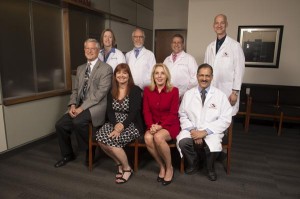
Teamwork is key at CSI. The members of the clinical/management team are: (standing, left to right): Loretta Colvin, Mark Muehlbach, Joseph Ojile, Matthew Uhles; (seated, left to right): Rick Shore, Anita Hopkin, Elizabeth Kelly, Korgi Hegde.
For Muehlbach, one of the keys to CSI’s success is that “Dr Ojile gives us a lot of flexibility.”
And while the handpicked team Ojile assembled in 2002 works well together, Muehlbach notes they are still individuals. “We got together people we like, but we don’t all think alike. We might butt heads sometimes but we still respect each other,” he says.
From Uhles’ perspective, it boils down to one essential: “Nothing we do is sacred. Anything we do is open to change,” he says.
Colvin sees the fact that CSI is a physician-owned business as its biggest asset. “We’re flexible,” she says. “We can be forward thinkers and nimble. Having a physician-owner who is a native of St Louis, it’s important to him that the business serve the community.”
C.A. Wolski is a Los Angeles-based trade magazine writer and has been contributing to Sleep Review since 2001. During that time, he has watched home sleep testing mature from a trailblazing, cutting-edge idea to a standard part of the workflow. Send questions and comments to [email protected].


